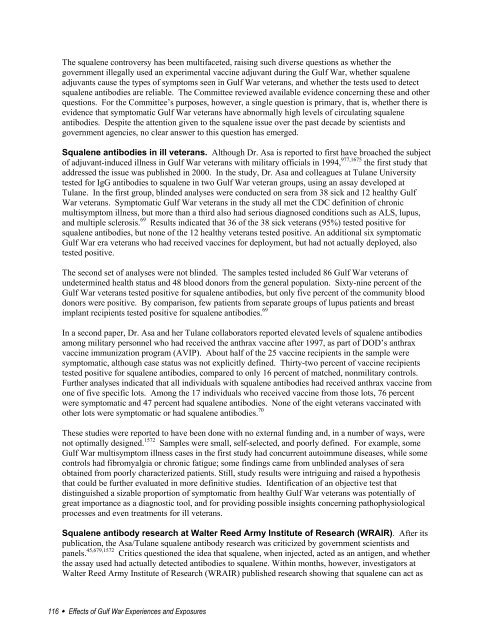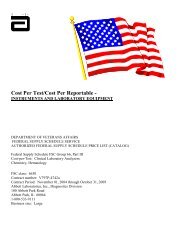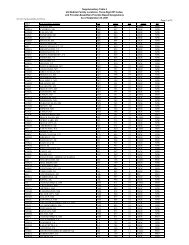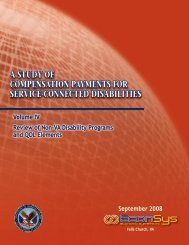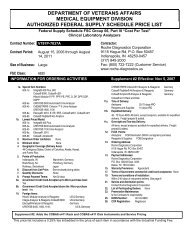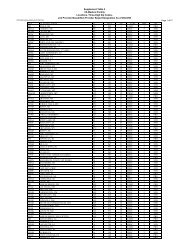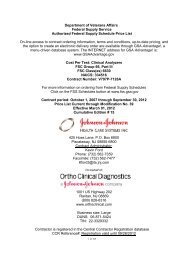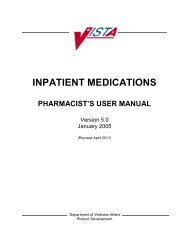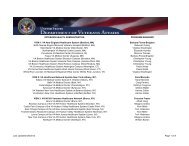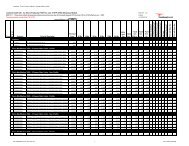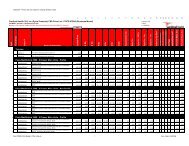Gulf War Illness and the Health of Gulf War Veterans Scientific ...
Gulf War Illness and the Health of Gulf War Veterans Scientific ...
Gulf War Illness and the Health of Gulf War Veterans Scientific ...
Create successful ePaper yourself
Turn your PDF publications into a flip-book with our unique Google optimized e-Paper software.
The squalene controversy has been multifaceted, raising such diverse questions as whe<strong>the</strong>r <strong>the</strong><br />
government illegally used an experimental vaccine adjuvant during <strong>the</strong> <strong>Gulf</strong> <strong>War</strong>, whe<strong>the</strong>r squalene<br />
adjuvants cause <strong>the</strong> types <strong>of</strong> symptoms seen in <strong>Gulf</strong> <strong>War</strong> veterans, <strong>and</strong> whe<strong>the</strong>r <strong>the</strong> tests used to detect<br />
squalene antibodies are reliable. The Committee reviewed available evidence concerning <strong>the</strong>se <strong>and</strong> o<strong>the</strong>r<br />
questions. For <strong>the</strong> Committee’s purposes, however, a single question is primary, that is, whe<strong>the</strong>r <strong>the</strong>re is<br />
evidence that symptomatic <strong>Gulf</strong> <strong>War</strong> veterans have abnormally high levels <strong>of</strong> circulating squalene<br />
antibodies. Despite <strong>the</strong> attention given to <strong>the</strong> squalene issue over <strong>the</strong> past decade by scientists <strong>and</strong><br />
government agencies, no clear answer to this question has emerged.<br />
Squalene antibodies in ill veterans. Although Dr. Asa is reported to first have broached <strong>the</strong> subject<br />
<strong>of</strong> adjuvant-induced illness in <strong>Gulf</strong> <strong>War</strong> veterans with military <strong>of</strong>ficials in 1994, 977,1675 <strong>the</strong> first study that<br />
addressed <strong>the</strong> issue was published in 2000. In <strong>the</strong> study, Dr. Asa <strong>and</strong> colleagues at Tulane University<br />
tested for IgG antibodies to squalene in two <strong>Gulf</strong> <strong>War</strong> veteran groups, using an assay developed at<br />
Tulane. In <strong>the</strong> first group, blinded analyses were conducted on sera from 38 sick <strong>and</strong> 12 healthy <strong>Gulf</strong><br />
<strong>War</strong> veterans. Symptomatic <strong>Gulf</strong> <strong>War</strong> veterans in <strong>the</strong> study all met <strong>the</strong> CDC definition <strong>of</strong> chronic<br />
multisymptom illness, but more than a third also had serious diagnosed conditions such as ALS, lupus,<br />
<strong>and</strong> multiple sclerosis. 69 Results indicated that 36 <strong>of</strong> <strong>the</strong> 38 sick veterans (95%) tested positive for<br />
squalene antibodies, but none <strong>of</strong> <strong>the</strong> 12 healthy veterans tested positive. An additional six symptomatic<br />
<strong>Gulf</strong> <strong>War</strong> era veterans who had received vaccines for deployment, but had not actually deployed, also<br />
tested positive.<br />
The second set <strong>of</strong> analyses were not blinded. The samples tested included 86 <strong>Gulf</strong> <strong>War</strong> veterans <strong>of</strong><br />
undetermined health status <strong>and</strong> 48 blood donors from <strong>the</strong> general population. Sixty-nine percent <strong>of</strong> <strong>the</strong><br />
<strong>Gulf</strong> <strong>War</strong> veterans tested positive for squalene antibodies, but only five percent <strong>of</strong> <strong>the</strong> community blood<br />
donors were positive. By comparison, few patients from separate groups <strong>of</strong> lupus patients <strong>and</strong> breast<br />
implant recipients tested positive for squalene antibodies. 69<br />
In a second paper, Dr. Asa <strong>and</strong> her Tulane collaborators reported elevated levels <strong>of</strong> squalene antibodies<br />
among military personnel who had received <strong>the</strong> anthrax vaccine after 1997, as part <strong>of</strong> DOD’s anthrax<br />
vaccine immunization program (AVIP). About half <strong>of</strong> <strong>the</strong> 25 vaccine recipients in <strong>the</strong> sample were<br />
symptomatic, although case status was not explicitly defined. Thirty-two percent <strong>of</strong> vaccine recipients<br />
tested positive for squalene antibodies, compared to only 16 percent <strong>of</strong> matched, nonmilitary controls.<br />
Fur<strong>the</strong>r analyses indicated that all individuals with squalene antibodies had received anthrax vaccine from<br />
one <strong>of</strong> five specific lots. Among <strong>the</strong> 17 individuals who received vaccine from those lots, 76 percent<br />
were symptomatic <strong>and</strong> 47 percent had squalene antibodies. None <strong>of</strong> <strong>the</strong> eight veterans vaccinated with<br />
o<strong>the</strong>r lots were symptomatic or had squalene antibodies. 70<br />
These studies were reported to have been done with no external funding <strong>and</strong>, in a number <strong>of</strong> ways, were<br />
not optimally designed. 1572 Samples were small, self-selected, <strong>and</strong> poorly defined. For example, some<br />
<strong>Gulf</strong> <strong>War</strong> multisymptom illness cases in <strong>the</strong> first study had concurrent autoimmune diseases, while some<br />
controls had fibromyalgia or chronic fatigue; some findings came from unblinded analyses <strong>of</strong> sera<br />
obtained from poorly characterized patients. Still, study results were intriguing <strong>and</strong> raised a hypo<strong>the</strong>sis<br />
that could be fur<strong>the</strong>r evaluated in more definitive studies. Identification <strong>of</strong> an objective test that<br />
distinguished a sizable proportion <strong>of</strong> symptomatic from healthy <strong>Gulf</strong> <strong>War</strong> veterans was potentially <strong>of</strong><br />
great importance as a diagnostic tool, <strong>and</strong> for providing possible insights concerning pathophysiological<br />
processes <strong>and</strong> even treatments for ill veterans.<br />
Squalene antibody research at Walter Reed Army Institute <strong>of</strong> Research (WRAIR). After its<br />
publication, <strong>the</strong> Asa/Tulane squalene antibody research was criticized by government scientists <strong>and</strong><br />
panels. 45,679,1572 Critics questioned <strong>the</strong> idea that squalene, when injected, acted as an antigen, <strong>and</strong> whe<strong>the</strong>r<br />
<strong>the</strong> assay used had actually detected antibodies to squalene. Within months, however, investigators at<br />
Walter Reed Army Institute <strong>of</strong> Research (WRAIR) published research showing that squalene can act as<br />
116 • Effects <strong>of</strong> <strong>Gulf</strong> <strong>War</strong> Experiences <strong>and</strong> Exposures


